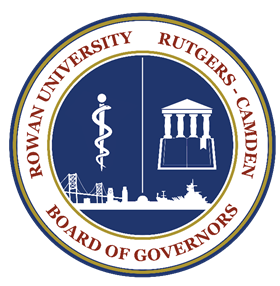SJIPH seeks partners to improve region’s health and health equity in first call for proposals
SJIPH seeks partners to improve region’s health and health equity in first call for proposals

The South Jersey Institute for Population Health (SJIPH) established by the Rowan University/Rutgers-Camden Board of Governors, in collaboration with Rowan University and Rutgers University-Camden, to improve health outcomes in our region, is pleased to announce its inaugural funding initiative for 2021.
Beginning today, April 15, SJIPH is accepting proposals for research projects that involve collaborative partnerships between Rowan University and Rutgers University-Camden researchers and community-based organizations in Burlington, Camden, Gloucester, Cumberland, Salem, Atlantic, and Cape May counties. Grants will be made up to $20,000.
Dana Redd, CEO of the Joint Board, highlighted SJIPH’s mission and the expected impact of the institute in South Jersey.
“On behalf of the Joint Board, we are extremely excited to see this first round of funding opportunities get underway and for the growth of the innovative SJIPH to really begin,” Redd said. “Over the lifespan of these projects we will see new collaborative partnerships formed between government agencies, nonprofit organizations, and our region’s premiere academic and research institutions. It is our hope and expectation that these relationships, along with the community’s active input and participation, result in lasting contributions to public health and health equity throughout South Jersey.”
Prospective grantees must submit a brief letter of intent by May 31. Final proposals will be due Nov. 1, and funding decisions are expected to be made by Dec. 15. Projects for this initiative are expected to use a public health, population health or population medicine approach to improving health or reducing health disparities in South Jersey, as well as promoting health equity. Details on the grants process and the submission portal can be found at sjiph.org.
Joint Board Chairwoman Michellene Davis, Esq., talked about the institute’s broader objectives and how SJIPH will establish a public health research footprint in South Jersey.
“We are well aware of the impact of structural and systemic barriers to achieving equitable community health and well-being, but most have yet to achieve a comprehensive understanding of how specific populations in South Jersey have been and continue to be impacted,” Davis said. “The institute was created to develop a local understanding of how structural and systemic racism, socio-economic, environmental and other population characteristics are effecting health outcomes in our communities, and to ensure that through collaboration and cooperation, that data is easily accessible for those seeking to stimulate change.”
Dr. Annette C. Reboli, Dean of Cooper Medical School of Rowan University, discussed the institute’s position to unite the region’s research and academic assets in pursuit of enhanced health outcomes.
“This is another opportunity to leverage the collective capacity of our region’s medical, academic, and research institutions for the betterment of communities throughout the region,” Reboli said. “I look forward to reviewing the proposals with our team and speaking with prospective awardees to discuss how their work can drive positive change, especially in urban and rural communities which have been historically underserved.”
Michael Palis, Ph.D., provost and executive vice chancellor at Rutgers University–Camden, points to the impact that this collaborative initiative will have on elevating Camden’s reputation as a global destination for innovation, as well as research partnerships moving forward.
“Every day, we develop ideas and programs that make the world a better place. At Rutgers University–Camden, innovation is central to our mission and this partnership with Rowan is creating a new model for public universities nationwide,” said Dr. Palis. “Our collaboration will be nothing short of transformational; delivering a replicable model for how our public research universities can build regional and national capacity together in addressing inequity and facing today’s complex challenges in population health.”
Nationally recognized researchers from both Rowan University and Rutgers–Camden will co-lead the initiative. Nicole A. Vaughn, MS, Ph.D. is a faculty member and research health psychologist in the Public Health and Wellness program in the Department of Health and Exercise Science at Rowan University, and Sarah Allred, Ph.D. is an associate professor in the Department of Psychology at Rutgers-Camden, as well as director of the Senator Walter Rand Institute for Public Affairs. They will oversee an eight-member committee made up of community leaders, faculty from both institutions, and public health representatives that will assist in the review and selection process.
“Collaboration is the hallmark of any successful initiative and SJIPH's focus on ensuring all projects include community stakeholders, as well as faculty from Rowan University and Rutgers-Camden, will make this work not only more inclusive, but lead to further more fruitful research collaborations in the future that will benefit the southern New Jersey region,” Vaughn said.
“South Jersey has never had a sustained regional collaboration focused on improving health and reducing health disparities, and similar initiatives at the local level are seldom found throughout the country. We expect this to be a model for others to build upon moving forward,” Allred said.
ABOUT SJIPH: The South Jersey Institute for Population Health (SJIPH) is focused on advancing collaborative research projects to improve health and well-being in southern New Jersey. In 2018, it was established through a state grant received by the Rowan University/ Rutgers-Camden Board of Governors (Joint Board) to integrate the region’s medical, educational and research assets, to improve health for Southern New Jersey. The Joint Board will include Rowan University and Rutgers University-Camden as partners in these efforts. SJIPH will serve as a hub for research collaboration, community connection and innovation that improves health and health equity in populations and communities across the region. Learn more at www.sjiph.org